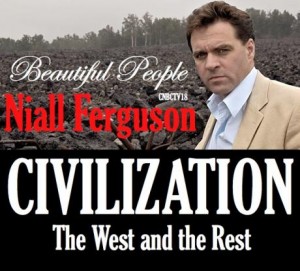Doesn’t Historical Amnesia Diminish Political Understanding?
 There is little more demoralizing and disorienting to us moderns than being lost in a perpetual present.
There is little more demoralizing and disorienting to us moderns than being lost in a perpetual present.
Historical amnesia is the lot of those whose worldview is little more than a hodgepodge of media commentary, especially from television and newspapers. It is indeed a tragedy for the less educated who blend together the infotainment of Opra Winfrey, Bill O’Reilly, and Nancy Grace, as if pop culture is capable of synthesizing something meaningful about the political order around us.
Imagine yourself waking up with full-blown personal amnesia–you remember nothing from your past, nothing about your family or childhood, nothing at all. This is why historians like Niall Ferguson are so important, because they help us remember our collective past, as in his comments about his new book, Civilization, The West and the Rest:
 Economic history is not politically correct. Many on the left therefore struggle with its findings. It is indeed astonishing that, from the beginning of the 16th century until the third quarter of the 20th century, the West (Europe and its settler colonies) did much better than the rest of the world and came to rule over it. But that’s what happened.
Economic history is not politically correct. Many on the left therefore struggle with its findings. It is indeed astonishing that, from the beginning of the 16th century until the third quarter of the 20th century, the West (Europe and its settler colonies) did much better than the rest of the world and came to rule over it. But that’s what happened.
By the 1970s the average American was roughly 20 times richer than the average Chinese. The average Briton was at least 12 times richer than the average Indian. In the first half of the 20th century, westerners had life expectancy nearly twice that of non-westerners. Europeans and North Americans even grew taller than Asians.
Moreover, a dozen western empires were able literally to rule most of the world. At their zenith, these empires encompassed three fifths of the earth’s land surface and population and controlled three quarters of economic output. Fewer than 1,000 British civil servants governed the entire Indian subcontinent.
Explaining why this extraordinary divergence came about is the principal task I set myself in writing Civilization: The West and the Rest. The book argues that we cannot do so in terms of geography, the weather, culture — and least of all in terms of race. I write: ‘The idea that the success of the United States was contingent on racial segregation was nonsense.’ I call racism a ‘pseudo-science that ranks alongside the ideology of communism as the most lethal of all Western civilization’s exports’.
 There is little more demoralizing and disorienting to us moderns than being lost in a perpetual present.
There is little more demoralizing and disorienting to us moderns than being lost in a perpetual present.  Economic history is not politically correct. Many on the left therefore struggle with its findings. It is indeed astonishing that, from the beginning of the 16th century until the third quarter of the 20th century, the West (Europe and its settler colonies) did much better than the rest of the world and came to rule over it. But that’s what happened.
Economic history is not politically correct. Many on the left therefore struggle with its findings. It is indeed astonishing that, from the beginning of the 16th century until the third quarter of the 20th century, the West (Europe and its settler colonies) did much better than the rest of the world and came to rule over it. But that’s what happened.